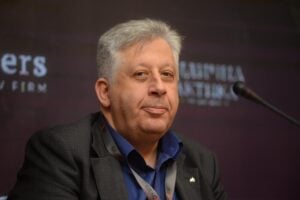Discussion with Semen Khanin: “We Can Only Change the Country When We Are Ready to Change Ourselves”
AMBER Law Company | View firm profile
In a recent discussion, Semen Khanin, a recognized expert in banking, finance, white-collar crime, and anti-corruption law, shared a candid analysis of Ukraine’s ongoing reform efforts and the persistent systemic challenges that threaten true transformation.
Key Points:
Why does no reform have the expected effect?
“Because these are not reforms, but imitation,” explains Khanin.
“We change something, adopt new laws, create new bodies, but the system itself remains unchanged. And if you try to ‘defeat’ corruption while keeping the corrupt mechanisms intact, you’re only making corruption more expensive.”
Mr. Khanin points out that the problem lies not in the legislation itself, but in the state’s excessive interference in economic and social processes.
“Where there is state control, there is corruption. Tax authorities, customs, public procurement — these systems create opportunities for abuse. Wherever the state assumes too many functions — road construction, service administration, business oversight — corruption risks inevitably arise. You don’t need to look far: compare the state postal service to private logistics companies. One works efficiently, the other doesn’t. Why? Because where there is real competition and private accountability, the system works. The same principle should be applied elsewhere — more functions need to be transferred to the private sector.”
Anti-Corruption Control and Business
“Business and corruption are not allies, but victims of the system,” says Mr. Khanin.
“No entrepreneur wants to pay bribes. But when they cannot operate without doing so, when they are forced to play by such rules, they become part of the system. And the more we try to ‘strengthen anti-corruption control,’ the harder it becomes to run a business. Power changes, but the principles remain the same — the system itself creates conditions where corruption is nearly unavoidable.”
Judicial Independence: A Persistent Myth
“Let’s be honest: a judge is a human being like anyone else. When they’re constantly under pressure or face the threat of criminal prosecution for their rulings, can we really speak of independence?” Khanin emphasizes.
“Every government seeks to exert control over the judiciary and always finds new mechanisms to do so. If every new government makes it clear that ‘correct’ decisions can only be expected from loyal judges, what will be the behaviour of judges?
Will they risk everything for the sake of principle? Some might. But most will look for a compromise.
As long as pressure on the judiciary persists, genuine independence will remain unattainable.”
Three Steps Toward Real Change
Semen Khanin identifies three critical priorities for achieving genuine reform:
-
- Minimize government control where it is not needed.
“The less regulation, the less corruption. Transfer some state functions to private hands.” - Eliminate unnecessary regulations and bureaucratic barriers.
“Reduce bureaucratic procedures that create grounds for bribery. Many procedures exist solely to generate opportunities for kickbacks. Fewer inspections and regulations mean fewer opportunities for corruption.” - Implement real public control over governance and spending.
“True public control means involving citizens in actual decision-making processes, as practiced in Switzerland — not declarative participation, but real influence over how and where public funds are spent.”
- Minimize government control where it is not needed.
“We can only change the country when we are ready to change ourselves. No external pressure, donor support, or international monitoring will help until we stop tolerating corruption in everyday life — and start demanding accountability at every level.”
— Semen Khanin
Author: Semen Khanin, PhD in Economics, LLM, Managing Partner, AMBER Law Company, Attorney at Law, Honoured Lawyer of Ukraine, Associate Professor of the Department of Management, Marketing and Public Administration at the International Scientific and Technical University named after Academician Yury Bugay.
